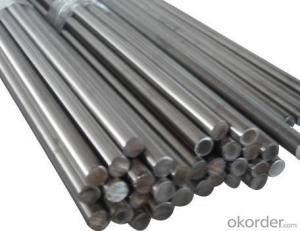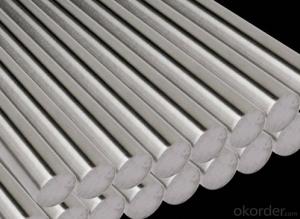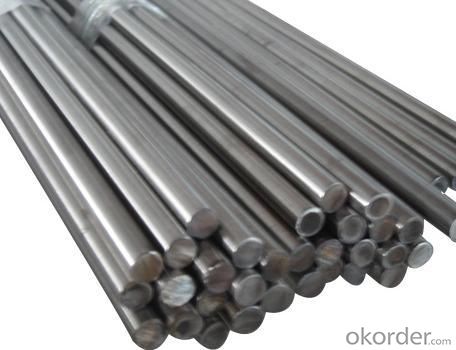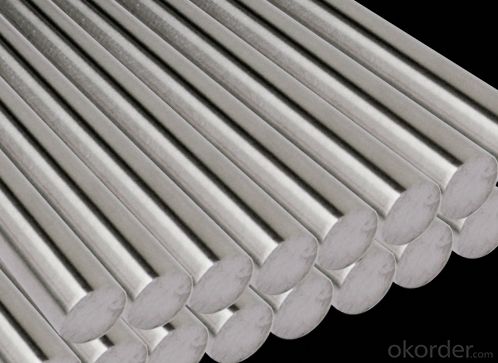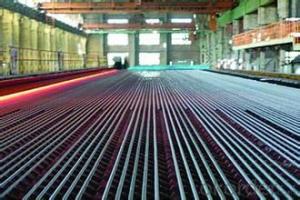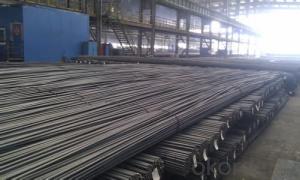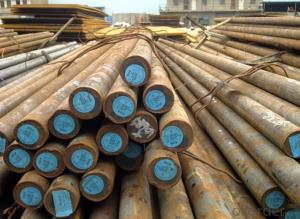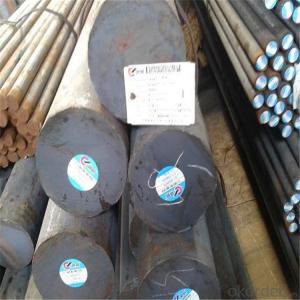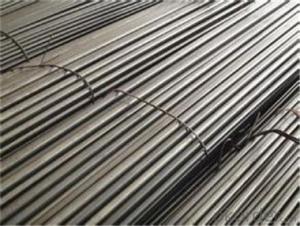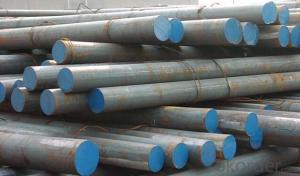A36 Round Steel Bar Large Quantity in Stock
- Loading Port:
- Dalian
- Payment Terms:
- TT OR LC
- Min Order Qty:
- 5 m.t.
- Supply Capability:
- 10000 m.t./month
OKorder Service Pledge
OKorder Financial Service
You Might Also Like
Specification
A36 Round Steel Bar Large Quantity in Stock
Quick Details
Standard: | JIS, AISI, ASTM, DIN, EN | Dimensions: | c45,1020,q235,Q345,A36 | Grade: | 200 Series |
Place of Origin: | China (Mainland) | Brand Name: | steel | Model Number: | carbon steel,mild steel |
Type: | Round | Application: | Hot Work Tool Steel/Plastic Molds | Shape: | Round |
Certification: | BV | Special Use: | Valve Steels | Technique: | hot rolled,cold drawn,forged |
Packaging & Delivery
Packaging Details: | Usual seaworthy export packing |
Delivery Detail: | 15 days |
Specifications
1.Competitive price
2.Prime quality
3.Best service
4.Quick deliver time
5 BV ,SGS
Description
Description | Carbon Steel Rod/Carbon Steel Bar,carbon steel rod,carbon steel shaft,mild steel bar, mild steel shaft,ms bar | |
Material | ASTM | 1005,1006,1008,1010,1015,1020,1025,1030,1035, 1040,1045,1050,1055,1060,1065,1070,1080,1084, 1016,1022 |
DIN | Ck10,Ck15,Ck22,Ck25,Ck30,Ck35,Ck40,Ck45,Ck50, 30Mn4,40Mn4 | |
BS | 040A04,095M15,045M10,080A40,045M10,080M50 | |
Standard | GB/T799,ASTM A29,A108,A321,A575,BS970,DIN1652,JIS G4051 | |
Section shape | Round,square,hexagonal,flat,angle | |
Surface | Black painted,galvanized | |
Specifications | Round bar | Diameter: 4mm~800mm |
Angle bar | Size: 3mm*20mm*20mm~12mm*800mm*800mm | |
Square bar | Size: 4mm*4mm~100mm*100mm | |
Flat bar | Thickness: 2mm~100mm | |
Width:10mm~500mm | ||
Hexagonal | Size: 4mm~800mm | |
Length | 2m,4m,5.8m,6m,11.8m,12m or as required. | |
Trade terms | Payment terms | T/T,L/C,Western Union |
Price terms | FOB,CIF,CFR,EXW | |
Package | Bundled,wooden box for export standard package. | |
Export to | Ireland,Singapore,Indonesia,Ukraine,Saudi Arabia,Spain,Canada, USA,Brazil,Thailand,Korea,Italy,India,Egypt,Oman,Malaysia, Kuwait,Canada, Viet Nam, Peru,Mexico,Dubai, Russia,etc | |
Delivery Time | Normally according to the order quantity | |
Application | Carbon steel rod applies to chemical industry, shipping industry, manufacturing industry,construction,decorate Industry,electric power,pump shafts, sanitary wares,furniture handles,boiler,high temperature resistant,low temperature resistant, corrosion resistant. | |
Contacts | If you have any questions,please feel free to contact me. | |
Picture
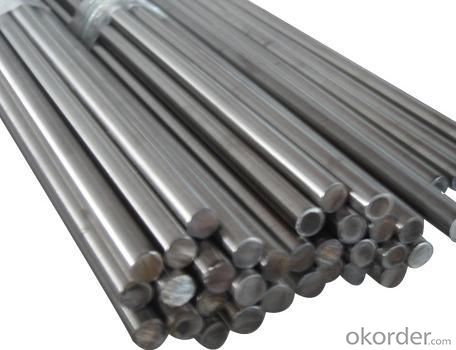
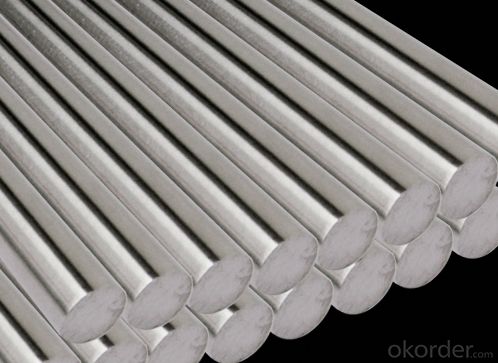
- Q: How to make the magnetic steel, can be like a magnet?
- Magnetization. Winding the insulated wire on the object, passing in the direct current, and taking it down after a period of time.
- Q: What are the different types of steel pipe supports for thermal expansion?
- There are several types of steel pipe supports for thermal expansion, including fixed supports, sliding supports, and variable spring supports. Fixed supports are rigid and do not allow for movement, while sliding supports allow for limited axial movement. Variable spring supports use mechanical springs to accommodate thermal expansion and contraction, providing continuous support while allowing for movement.
- Q: What is the impact of temperature on steel pipes?
- The significance of temperature on steel pipes cannot be underestimated, as it can bring about both positive and negative consequences. When exposed to high temperatures, steel pipes undergo thermal expansion, which can result in distortion or buckling. This expansion also has the potential to affect joints and connections, leading to leaks or failures. Hence, it is imperative to take into consideration the coefficient of thermal expansion during the design and installation of steel pipes in environments with elevated temperatures. Conversely, steel pipes possess remarkable thermal conductivity, enabling them to endure high temperatures without substantial deterioration. This characteristic renders them suitable for applications where heat transfer is of utmost importance, such as in industrial processes or heating systems. Extreme cold temperatures also pose a threat to steel pipes. Freezing conditions cause water or other fluids within the pipes to expand, resulting in cracks or bursts. This can lead to leaks, fluid loss, and potential harm to surrounding structures. Consequently, it is necessary to implement appropriate insulation and preventive measures to ensure the integrity of steel pipes in cold environments. Moreover, temperature fluctuations can impact the mechanical properties of steel, including its tensile strength and toughness. Prolonged exposure to elevated temperatures can cause a phenomenon known as thermal degradation, which diminishes the steel's strength and renders it more susceptible to deformation or failure. In conclusion, temperature exerts a significant influence on steel pipes, affecting their structural integrity, thermal performance, and mechanical properties. Proper design, insulation, and maintenance are crucial to guarantee the safe and efficient operation of steel pipes under varying temperature conditions.
- Q: What are the different grades of steel used for pipes?
- The different grades of steel used for pipes include carbon steel, alloy steel, and stainless steel.
- Q: What are the applications of steel pipes in the automotive industry?
- Steel pipes are widely used in the automotive industry for various applications such as exhaust systems, fuel lines, and structural components. These pipes provide durability, high strength, and resistance to corrosion, making them ideal for withstanding the harsh conditions and requirements of automotive applications. Additionally, steel pipes are lightweight, cost-effective, and offer excellent formability, enabling efficient manufacturing and design flexibility for automotive manufacturers.
- Q: Are steel pipes suitable for pharmaceutical manufacturing facilities?
- Yes, steel pipes are suitable for pharmaceutical manufacturing facilities. Steel pipes are commonly used in pharmaceutical manufacturing due to their excellent corrosion resistance and durability. They can withstand high pressure and temperature conditions, making them ideal for various applications such as transporting fluids, gases, and chemicals within the facility. Additionally, steel pipes can be easily cleaned and sanitized, ensuring the integrity and safety of pharmaceutical products. Furthermore, steel pipes are cost-effective and have a long service life, making them a reliable choice for pharmaceutical manufacturing facilities.
- Q: Can steel pipes be used for wastewater treatment plants?
- Yes, steel pipes can be used for wastewater treatment plants. Steel pipes are commonly used in wastewater treatment plants due to their durability, strength, and resistance to corrosion. They are suitable for conveying and transporting various types of wastewater and can withstand the harsh and corrosive environment found in these facilities. Additionally, steel pipes can be easily welded and joined, allowing for efficient installation and maintenance processes.
- Q: What are the advantages of using steel pipes in plumbing systems?
- There are several advantages of using steel pipes in plumbing systems. Firstly, steel pipes are highly durable and can withstand high levels of pressure, making them suitable for carrying water and other fluids. Additionally, steel pipes are resistant to corrosion, which ensures longevity and prevents leaks. Steel pipes also have a smooth interior surface, which improves water flow and reduces the risk of blockages. Moreover, steel pipes are fire-resistant and do not contribute to the spread of flames, enhancing overall safety. Lastly, steel pipes are environmentally friendly as they are often made from recycled materials and can be recycled again at the end of their lifespan.
- Q: How are steel pipes insulated against heat loss?
- Steel pipes are commonly insulated against heat loss by applying a layer of thermal insulation material around the pipes. This insulation material can be in the form of foam, mineral wool, or fiberglass. The insulation is typically wrapped tightly around the pipes and secured with adhesive or tape to ensure proper coverage. This insulation layer helps to reduce heat transfer through the pipe walls, thereby minimizing heat loss. Additionally, the insulation may be covered with a protective jacket or coating to provide further protection against external elements.
Send your message to us
A36 Round Steel Bar Large Quantity in Stock
- Loading Port:
- Dalian
- Payment Terms:
- TT OR LC
- Min Order Qty:
- 5 m.t.
- Supply Capability:
- 10000 m.t./month
OKorder Service Pledge
OKorder Financial Service
Similar products
Hot products
Hot Searches
Related keywords
